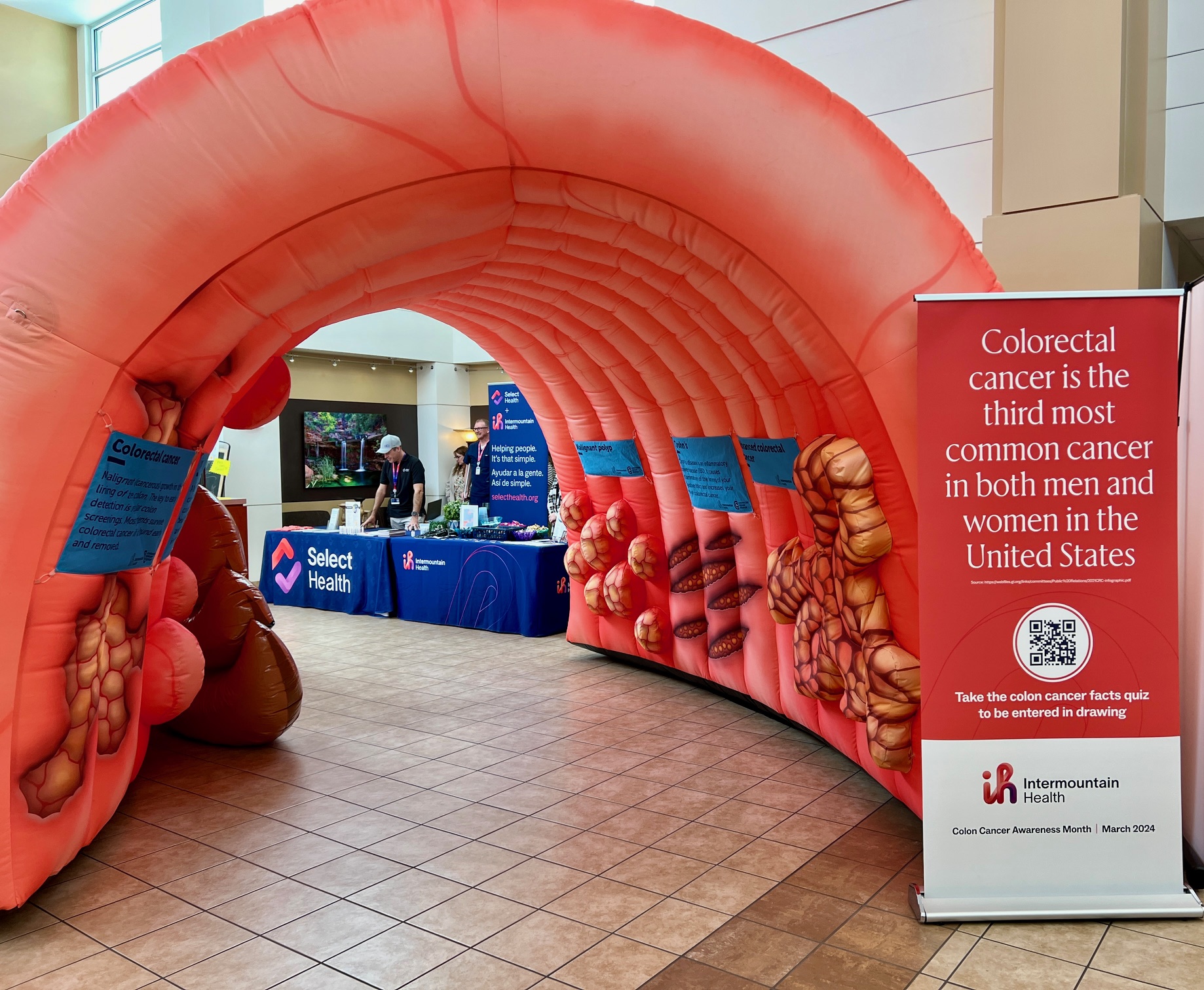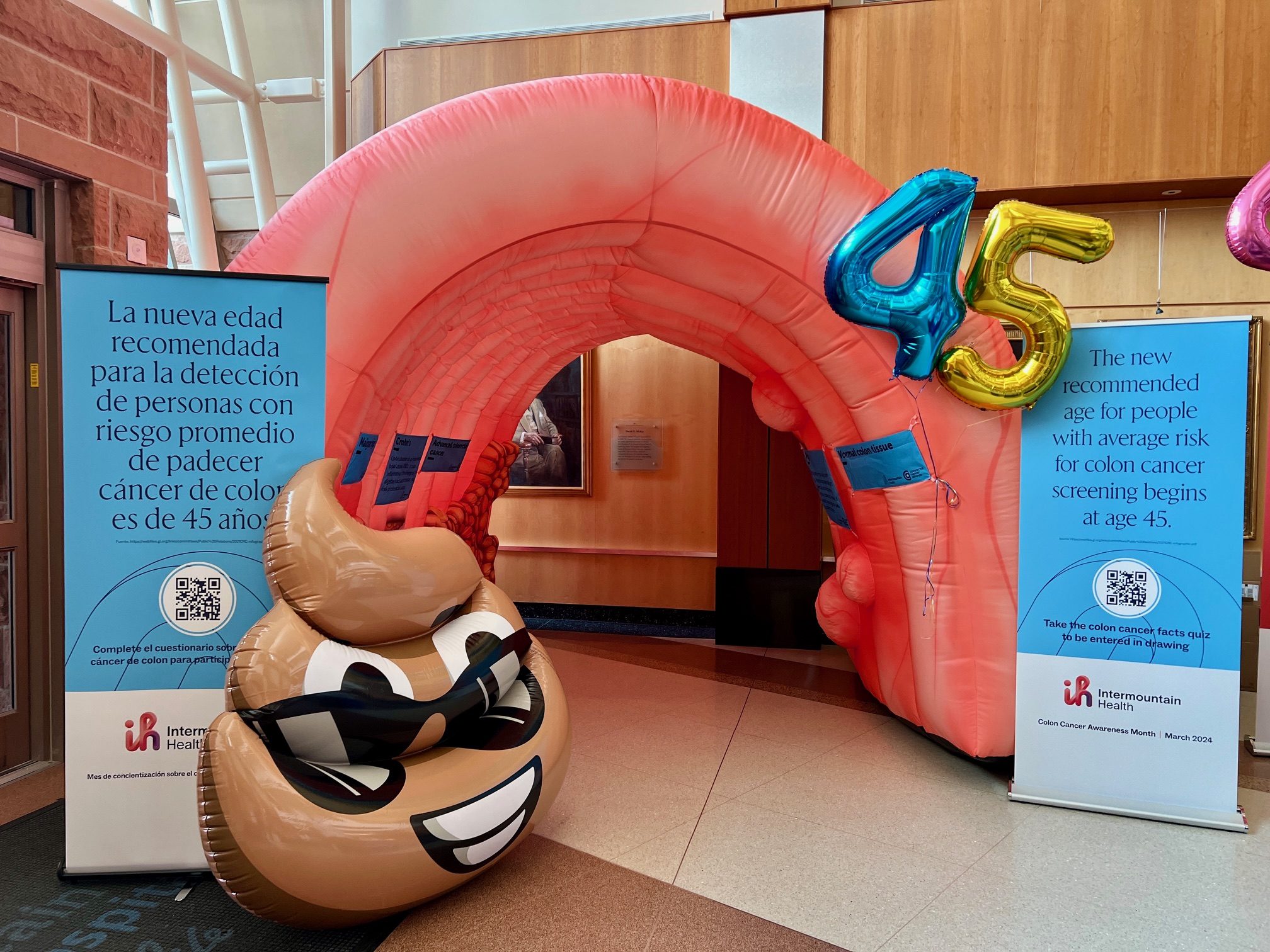
Intermountain Health’s “Let’s Get to the Bottom of Colon Cancer” Giant Inflatable Colon Community Tour Promotes Colon Screenings and Raises Awareness
Tonight from 6:05 PM at the Utah Tech University baseball game on the Bruce Hurst field.
Intermountain Health doubled its efforts in a unique community colorectal cancer public awareness campaign this March called, “Let’s Get to the Bottom of Colon Cancer,” educating and promoting colon screenings to thousands of residents.
Intermountain has two giant inflatable colons – nicknamed “Colin” and “Collette” – along with numerous cancer experts -which have traveled to 23 hospitals, clinics, and community centers in Utah and Idaho in 29 days in March during National Colorectal Cancer Awareness Month.
The objective of the campaign is to bring critical awareness about colon cancer and the importance of potentially life-saving screenings in a fun, visual, and hands-on manner.
The tour kicked off in Ogden at Intermountain McKay-Dee Hospital on March 1 and ends on Friday, March 29, with two events. One of the inflatable colons will be at Intermountain St. George Hospital from 10 AM to 2 PM and then Friday night at the Utah Tech University baseball game at 6:05 pm at Bruce Hurst field.
This is the second year for this unique public awareness tour, which is an interactive opportunity for the public to walk through 12-foot, 113-pound inflatable colons depicting different stages of colorectal cancer, starting with the earliest stage of a precancerous colon polyp.
The two giant inflatable colons have crisscrossed Utah and Idaho for various events throughout the month, including the Latino Health Fair in Park City and the Heber Valley Business Expo.
“This tour is an opportunity to spread awareness across all our communities to help our patients and their families learn about the importance of knowing their colon cancer risk and then moving forward with completing the best screening test for them, said Nathan Merriman, MD, medical director of gastroenterology and digestive health at Intermountain Health. “Colon cancer is preventable, treatable, beatable. In fact, colon cancer has a 90% survival rate when it’s detected early.”
The American Cancer Society estimates more than 53,000 Americans will die from colon cancer in 2024, making it the second leading cause of all cancer-related deaths in the United States.
“One alarming trend is the incidence rate of colorectal cancer continues to rise each year in people under the age of 55,” said Bryce Perkins, DO, hematologist-oncologist at Intermountain Cedar City Hospital. “Young people are also often diagnosed with more advanced cancers due to delays in detection, driving home the point that prevention is the best strategy to beat cancer.”
Dr. Merriman stresses that the goal is to get the public to take control of their health and better understand that individual risk factors, such as a family history of colorectal cancer, inherited genetic disorders, or certain lifestyle choices, may increase the likelihood that a person will develop colon cancer.
The only way to detect colon cancer it is through screening. People with an average risk of colon cancer should start their screenings at age 45.
Roger Jacobson, 53, Paragonah, knows firsthand the importance of early screening and listening to your doctor.

During a routine physical, Jacobson’s primary care physician told him it was past time to get a colonoscopy.
After two reminder calls, last February, Jacobson finally scheduled a colonoscopy where stage 2 colon cancer was discovered.
After surgery and chemotherapy, Jacobson says he’s feeling fine, has no sign of cancer, and is living proof not to put off your colonoscopies.
“It could have been too far advanced to remove had I waited any longer,” said Jacobson. “I have three kids, and I’m happy to be around a little longer.”
A colonoscopy, which is an examination of the inside of your colon, is the most effective method of screening for colon cancer, precancerous growths, and polyps. If an abnormal mass or polyp is identified during the outpatient procedure, the physician will identify the best course of treatment, which may include removing it during the procedure.
“Finding and removing precancerous growths during a colonoscopy can prevent cancer from developing,” said Dr. Merriman. “Delays in screening could lead to a delayed cancer diagnosis. A screening can really save a life and protect a family. We need everyone’s help to work together to prevent colon cancer across our communities.”
For the full inflatable colon tour, click here.
For more information on colonoscopies, click here.



